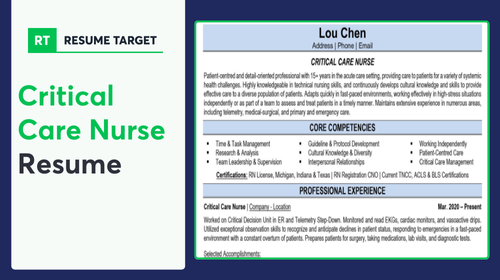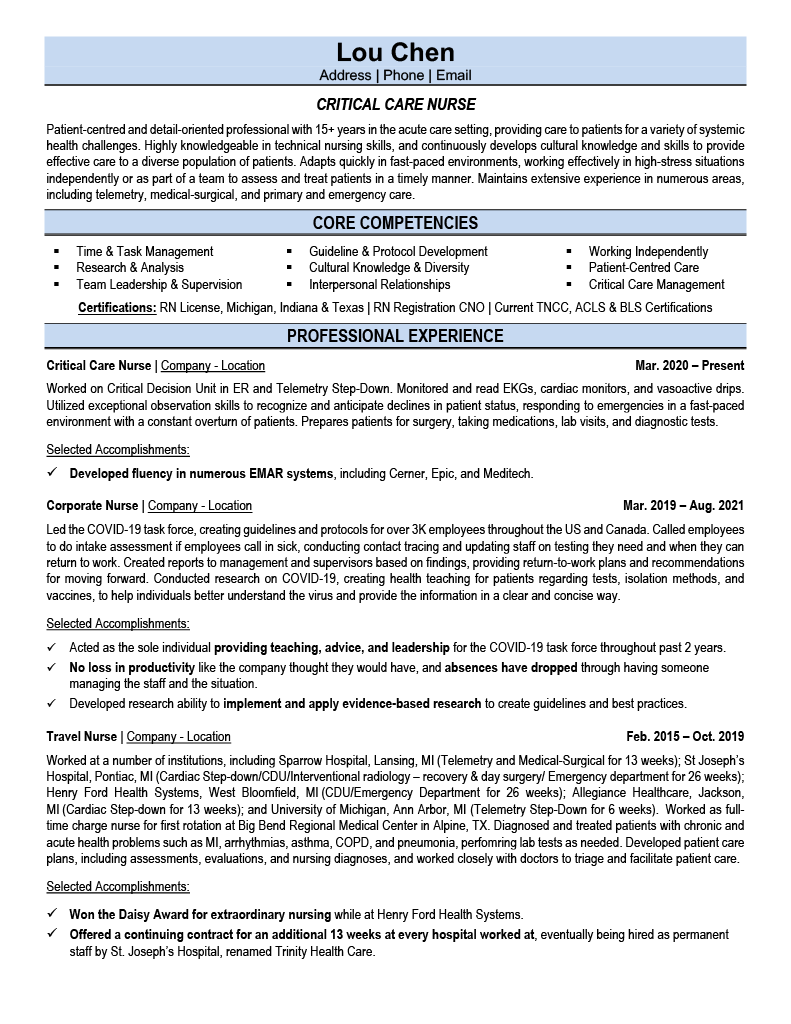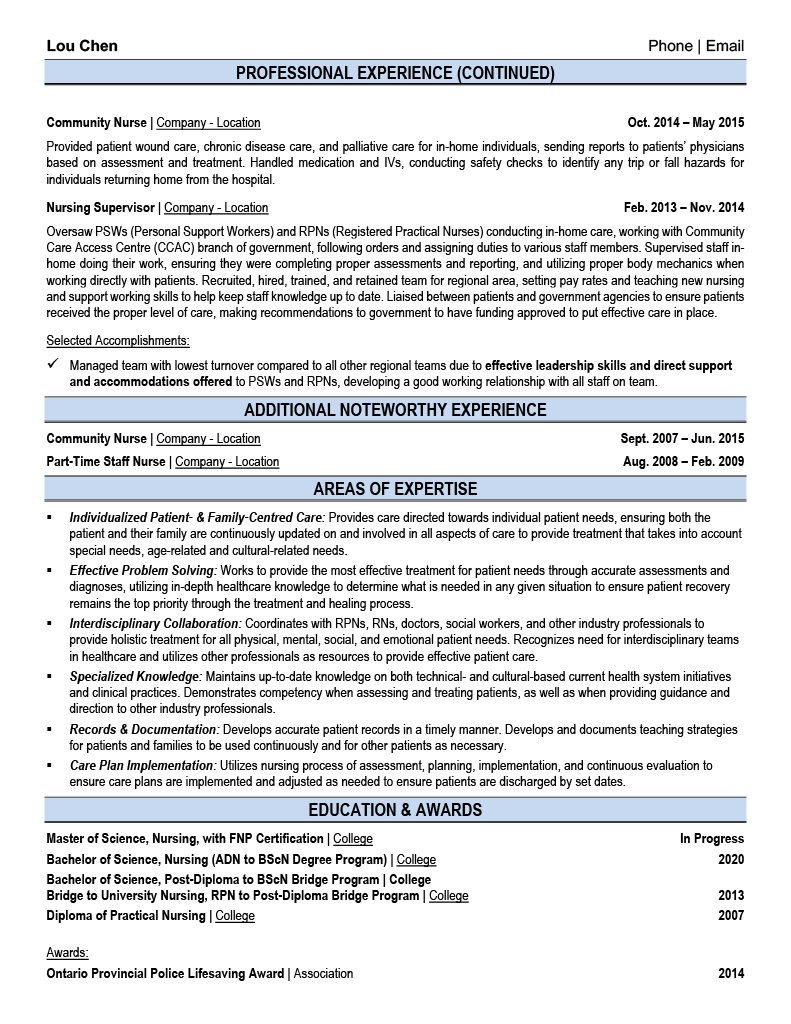

ICU nurses face a unique challenge: condensing life-saving skills and split-second decisions into a simple document. Your expertise in managing ventilators, medications, and critical interventions deserves more than a basic skills list.
Are you struggling to capture the intensity and importance of your ICU role on paper? Your resume needs to showcase both your technical mastery and your ability to remain calm under extreme pressure while coordinating complex patient care.
Resume Target specializes in translating critical care expertise into powerful career documents that hiring managers understand. We'll help you create a resume that demonstrates your clinical excellence, leadership in crisis situations, and proven ability to improve patient outcomes in the ICU setting.


When every second counts and patients are fighting for their lives, critical care nurses serve as the vigilant guardians of the ICU, where they manage complex medical situations and provide specialized care for critically ill patients during their most vulnerable moments.
Your role as a critical care nurse combines clinical expertise with quick thinking as you monitor vital signs, adjust life-support equipment, administer precise medications, and coordinate with medical teams to deliver moment-by-moment care that can mean the difference between life and death.
Whether you're just starting your nursing career or looking to specialize in critical care, this demanding yet rewarding field offers clear advancement paths through additional certifications, leadership roles, and specialized focus areas within intensive care settings.
Let's talk about the exciting earning potential in critical care nursing! Your specialized skills caring for patients in intensive care settings are highly valued, and here's what's amazing - your earning potential can more than double as you advance in your career and education. And guess what? Location and certifications can significantly boost your income, with urban areas and specialty credentials opening doors to higher compensation.
Figures from: Nursing Education
Starting as a registered nurse with a BSN, your path to becoming a Critical Care Nurse involves specialized training and certifications. With dedication and experience, you can advance from bedside care to leadership positions in intensive care units.
Beyond basic nursing skills, advancing in critical care requires mastery of complex clinical procedures and leadership capabilities.
- Advanced patient monitoring and life support management - Emergency response and crisis intervention expertise - Complex medical data interpretation and analysis - Team leadership and interdisciplinary collaborationTo become a Critical Care Nurse, you'll need to earn your RN license, gain med-surg experience, and complete specialized ICU training while developing crucial emergency care competencies.
Your success in critical care nursing will depend heavily on developing advanced clinical assessment skills and the ability to interpret complex medical data, which you can start building right now in your nursing journey.
Requirements from CareRev
Struggling to capture all your ICU experience, critical interventions, and patient care achievements in a way that truly shows your expertise as a critical care nurse? This comprehensive, section-by-section guide will walk you through creating a powerful nursing resume that highlights your life-saving skills and clinical excellence.
As a Critical Care Nurse who excels at making split-second decisions and managing complex patient care, you might find it challenging to translate your dynamic ICU expertise into a compelling written summary.
While you're skilled at monitoring multiple vital signs and coordinating with healthcare teams in high-pressure situations, capturing these abilities in a few powerful sentences requires a different kind of precision - one that helps hiring managers quickly recognize your life-saving capabilities.
How would you describe your overall approach to critical care nursing and the level of acuity you're most experienced in managing across your career?
Reason: This helps establish your professional identity and scope of practice immediately, allowing readers to understand your clinical comfort zone and expertise level in critical care settings.
What would you say are the most valuable combinations of technical skills and interpersonal abilities you bring to a critical care environment?
Reason: This question helps you articulate your unique value proposition by combining both clinical expertise and essential soft skills that are crucial in high-stakes critical care environments.
How have your years of critical care experience shaped your ability to handle complex patient cases while mentoring others and contributing to unit-wide improvements?
Reason: This helps frame your experience in terms of both direct patient care impact and broader organizational value, showing potential employers your capacity for leadership and system-level thinking.
As a Critical Care Nurse, your skills section needs to demonstrate both your advanced clinical expertise and your ability to perform in high-pressure situations while managing multiple critical patients.
From ventilator management and advanced cardiac life support to your proficiency with EMR systems and your ability to coordinate with interdisciplinary teams, your skills section should showcase both technical medical competencies and essential soft skills that make you an effective ICU professional.
Showcase your ICU expertise by organizing your clinical experience into three powerful sections: a concise role overview that sets the scene, measurable patient care achievements that demonstrate your impact, and core responsibilities that highlight your critical care competencies.
Many Critical Care Nurses struggle to translate their life-saving interventions and complex patient care into compelling resume achievements that stand out to hiring managers. Transform your daily ICU victories into powerful metrics by connecting your clinical expertise to concrete patient outcomes, reduced mortality rates, and improved departmental efficiency standards.
The responsibilities section demonstrates how Critical Care Nurses manage complex patient care beyond basic nursing duties. This section must translate technical medical procedures into clear achievements that showcase your impact on patient outcomes and hospital operations.
Your critical care credentials demonstrate your expertise in managing high-acuity patients and complex medical situations. Start with your highest nursing degree and include your CCRN certification, followed by any specialized certifications in areas like ACLS, PALS, or trauma nursing that showcase your advanced clinical capabilities.
Now that you've built a strong foundation using Resume Target's proven resume writing guidelines, you're ready to transform your CV into a powerful tool that showcases your nursing expertise.
While many critical care nurses focus solely on customizing their cover letters, tailoring your resume for each ICU position is equally crucial for highlighting your specific critical care competencies and specialized certifications.
A customized nursing resume not only helps you navigate through hospital HR systems and ATS filters by incorporating relevant keywords, but it also demonstrates to hiring managers that your emergency response skills and patient care approach perfectly align with their unit's needs.
Ready to make your critical care nursing resume stand out from the competition? Let's transform your experience into exactly what each employer is looking for!
Don't let limited ICU experience hold you back - your nursing journey starts here!
While your clinical rotations and nursing education have given you a strong foundation, you can create an impressive resume by highlighting your hands-on patient care experience, relevant certifications, and specialized critical care coursework.
Focus on showcasing your clinical competencies, technical nursing skills, and any simulation lab experience to demonstrate your ICU readiness.
For detailed guidance on formatting your healthcare credentials, check out the Student Resume Writing Guide for nursing-specific examples and templates.
Your nursing education and clinical rotations have equipped you with valuable hands-on patient care experience that deserves to be highlighted front and center in your resume summary.
Focus on showcasing your clinical achievements, certifications, and the specialized skills you've developed during your training to demonstrate your readiness for this challenging role.
"Dedicated and detail-oriented Critical Care Nurse with extensive clinical rotation experience in high-acuity settings and emergency response. Demonstrated excellence in patient assessment, ventilator management, and complex medication administration during 800+ hours of ICU clinical training. Holds current BLS, ACLS, and PALS certifications with specialized training in trauma care. Seeking to leverage strong clinical foundation and passion for patient advocacy to provide exceptional critical care at a leading medical facility."
Now's your chance to showcase the rigorous academic preparation that equipped you for the high-stakes world of critical care nursing!
Don't just list your nursing degree - highlight specialized coursework like Advanced Cardiac Life Support and clinical rotations in ICU settings, plus any research projects or simulation training that demonstrates your readiness for critical care.
Here are some courses common to a degree/certification for Critical Care Nurses: 1. **Question 1** 2. **Extracted information:** * ADN program curriculum: microbiology, anatomy, pharmacology, nursing principles, psychology, and clinical experiences [1]. * BSN programs: offer many of the same courses as an ADN, management, public health, nursing theory, and informatics [1]. 3. **Source URL:** * [https://nursejournal.org/careers/critical-care-nurse/how-to-become/](https://nursejournal.org/careers/critical-care-nurse/how-to-become/) [1]Relevant Coursework: Advanced Nursing Principles | Clinical Pharmacology | Human Anatomy & Physiology | Critical Care Management | Healthcare Informatics | Public Health & Nursing Theory
Key Projects:
Critical Care Simulation Project: Led a team-based intensive care simulation focusing on rapid response to cardiac emergencies and ventilator management. Developed comprehensive care plans while maintaining critical thinking under pressure.
Emergency Response Training Initiative: Participated in a multi-department emergency response training program focused on trauma care and crisis management in the ICU setting.
Leverage your nursing education, clinical rotations, and hands-on training experiences to showcase the vital skills you've developed through your academic preparation and practical training in critical care settings.
As an entry-level Critical Care Nurse, your foundation of clinical skills combined with your dedication to patient care positions you well for a rewarding career in intensive care units, where you'll continue to grow and develop your expertise while making a meaningful impact on patient outcomes.
When you're focused on saving lives and managing complex patient care, finding the right words to showcase your clinical expertise and emotional intelligence on paper can feel overwhelming.
At Resume Target, we understand the unique challenges Critical Care nurses face in the healthcare job market, and we've helped hundreds of ICU professionals translate their life-saving interventions and technical skills into powerful career documents.
Our specialized healthcare writers know exactly how to highlight your critical thinking abilities, emergency response achievements, and patient outcome metrics in a way that resonates with hiring managers.
With healthcare facilities actively competing for top ICU talent, don't let an underwhelming resume hold you back from your next career move - schedule your free consultation today to transform your clinical experience into a compelling career story.
Impress any hiring manager with our Nurse resume writing service. We work with all career levels and types of Nurse professionals.
Learn More → Nurse Resume Writing Services